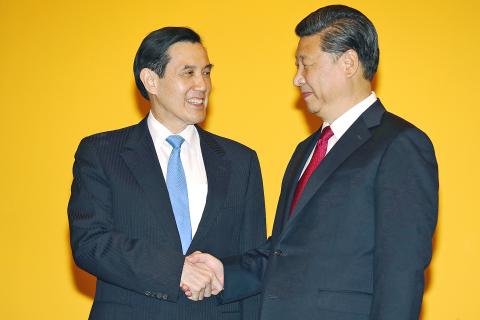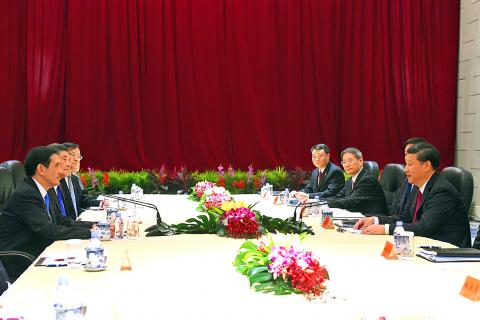President Ma Ying-jeou (馬英九) and Chinese President Xi Jinping (習近平) held a historic meeting in Singapore yesterday, the first time the leaders from both sides of the Taiwan Strait have met since 1949 after the Chinese Nationalist Party (KMT) was defeated by the Chinese Communist Party in the Chinese Civil War.
The summit, which began with the two exchanging an extended handshake before going behind closed doors, was trumpeted by Ma and Xi as a milestone in cross-strait relations.
“Today is a special day where leaders from two sides of the Strait meet,” said Xi, who was on a state visit to Singapore to celebrate the 25th anniversary of diplomatic ties between China and the Southeast Asian city-state.

Photo: AP
“Both sides of the Strait are brothers, a family of blood that is thicker than water,” Xi said in his opening remarks of the meeting at the Shangri-La Hotel.
Xi said: “We should let the world know with actions that Chinese on the two sides of the Strait are completely capable of solving our own problem with wisdom,” adding that both sides of the Strait have since 2008 moved toward a path of peaceful development and that people of the two sides have made great efforts to keep the cross-strait situation stable and harmonic over the past seven years.
“I hope that compatriots on both sides of the Strait can jointly uphold the [so-called] ‘1992 consensus,’ consolidate common political foundations, maintain the correct cross-strait development direction and jointly seek great invigoration of the Zhonghua minzu [Chinese ethnic group, 中華民族],” Xi added.

Photo: Taipei Times
The “1992 consensus” refers to a supposed understanding reached during cross-strait talks in 1992 that both Taiwan and China acknowledge that there is “one China,” with each side having its own interpretation of what that means. Former Mainland Affairs Council chairman Su Chi (蘇起) in 2000 admitted that he had made up the term “1992 consensus.”
Ma said that Taiwan would continue to consolidate the “1992 consensus,” maintaining the peaceful “status quo.”
He also called for lowering the state of hostility across the Strait and expanding cross-strait exchanges.
Ma said the “1992 consensus” was subject to the “one China” principle, neglecting to mention the “different interpretations” component that the KMT administration typically stresses.
During the meeting, Ma and Xi addressed each other as “mister,” rather than “president.”
While no agreements were signed and no joint statements were issued following the summit, China’s Taiwan Affairs Office Minister Zhang Zhijun (張志軍) told a post-meeting press conference that both Ma and Xi believe the “1992 consensus” should be upheld, as it “has great significance in promoting the long-term development of cross-strait relations.”
China and Taiwan both belong to “one China,” and dealings between the two sides are not “country-to-country” relations, nor a matter of “one China, one Taiwan,” Zhang cited Xi as saying.
Zhang said China welcomes Taiwan’s participation in the China-initiated Asian Infrastructure Investment Bank and its “One Belt, One Road” policy, adding that China is willing to consider and discuss the issue of Taiwan’s international space as long as Taiwan’s participation in regional economic integration and international activities “does not create the perception of ‘one China, one Taiwan,’ or ‘two Chinas.’”
Zhang quoted Xi as saying that “the forces seeking Taiwanese independence are the most real threat to cross-strait peace.”
Zhang said Xi agreed with Ma’s proposal to set up a cross-strait hotline, as it could help improve exchanges and dialogue.
Ma later told a separate press conference that he found Xi “pragmatic, flexible and frank.”
Ma said he hopes such a spirit could be reflected in the future handling of cross-strait matters.
During the meeting, Ma raised the issue of Taiwanese concern over China’s military deployment against Taiwan, he said.
According to Ma, Xi said that “the deployments do not target Taiwan.”
With regard to the “1992 consensus,” in response to reporters’ questions over Taiwan insisting that “one China” means the Republic of China, while Beijing emphasizes its “one China” principle, but intentionally ignores the latter part of the “consensus,” Ma said each side is free to interpret what “one China” means.
“That’s why some have said that [the ‘1992 consensus’] is a masterpiece of ambiguity,” Ma said.
Ma, who attended the closed-door meeting in the company of six other officials, said he found the summit helpful and positive, and reiterated that the purpose of the meeting with Xi was to take a first step toward paving a foundation so that a mechanism of institutionalized meetings between leaders from both sides of the Taiwan Strait could be established
From there, it can allow for the possibility of “super stable” cross-strait relations, he said.
Ma departed Singapore for Taiwan at 9pm on a charter flight after a dinner with Xi.
Later last night, Singaporean Prime Minister Lee Hsien Loong (李顯龍) posted a picture on Facebook of him having tea with Ma, adding: “Glad his meeting here went well. Hope this will lead to greater stability and prosperity for the region.”
Additional reporting by CNA

CHAOS: Iranians took to the streets playing celebratory music after reports of Khamenei’s death on Saturday, while mourners also gathered in Tehran yesterday Iranian Supreme Leader Ayatollah Ali Khamenei was killed in a major attack on Iran launched by Israel and the US, throwing the future of the Islamic republic into doubt and raising the risk of regional instability. Iranian state television and the state-run IRNA news agency announced the 86-year-old’s death early yesterday. US President Donald Trump said it gave Iranians their “greatest chance” to “take back” their country. The announcements came after a joint US and Israeli aerial bombardment that targeted Iranian military and governmental sites. Trump said the “heavy and pinpoint bombing” would continue through the week or as long

TRUST: The KMT said it respected the US’ timing and considerations, and hoped it would continue to honor its commitments to helping Taiwan bolster its defenses and deterrence US President Donald Trump is delaying a multibillion-dollar arms sale to Taiwan to ensure his visit to Beijing is successful, a New York Times report said. The weapons sales package has stalled in the US Department of State, the report said, citing US officials it did not identify. The White House has told agencies not to push forward ahead of Trump’s meeting with Chinese President Xi Jinping (習近平), it said. The two last month held a phone call to discuss trade and geopolitical flashpoints ahead of the summit. Xi raised the Taiwan issue and urged the US to handle arms sales to

State-run CPC Corp, Taiwan (CPC, 台灣中油) yesterday said that it had confirmed on Saturday night with its liquefied natural gas (LNG) and crude oil suppliers that shipments are proceeding as scheduled and that domestic supplies remain unaffected. The CPC yesterday announced the gasoline and diesel prices will rise by NT$0.2 and NT$0.4 per liter, respectively, starting Monday, citing Middle East tensions and blizzards in the eastern United States. CPC also iterated it has been reducing the proportion of crude oil imports from the Middle East and diversifying its supply sources in the past few years in response to geopolitical risks, expanding

Pro-democracy media tycoon Jimmy Lai’s (黎智英) fraud conviction and prison sentence were yesterday overturned by a Hong Kong court, in a surprise legal decision that comes soon after Lai was jailed for 20 years on a separate national security charge. Judges Jeremy Poon (潘兆初), Anthea Pang (彭寶琴) and Derek Pang (彭偉昌) said in the judgement that they allowed the appeal from Lai, and another defendant in the case, to proceed, as a lower court judge had “erred.” “The Court of Appeal gave them leave to appeal against their conviction, allowed their appeals, quashed the convictions and set aside the sentences,” the judges